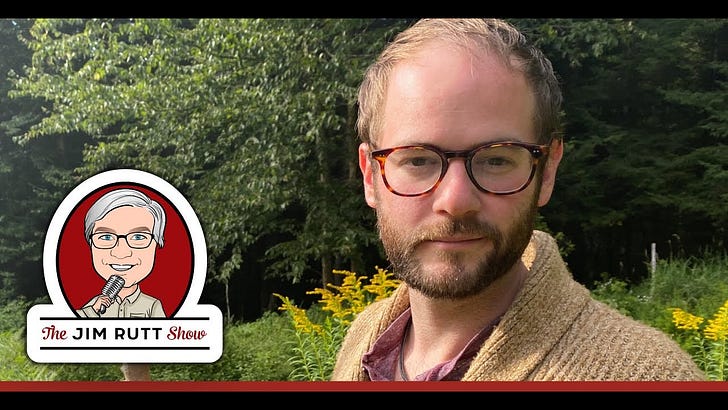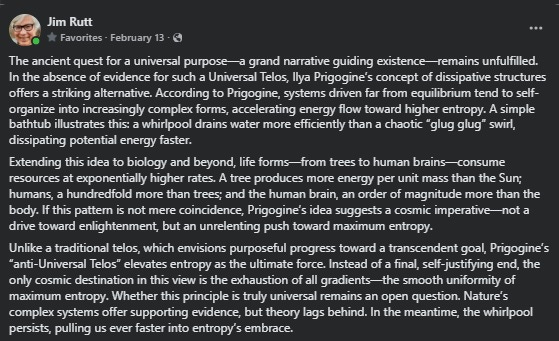Last month, Jim Rutt shared some musings on social media about the question of an “ultimate telos,” the hypothesis that the universe as a whole might be moving towards some particular goal, end, aim, or purpose. With a sharp mind deeply steeped in complexity theory (Jim was Chairman of the Santa Fe Institute, after all, and has hosted some of the world’s top complexity thinkers on his podcast!), his reflections zero in on what are indeed the most important aspects of this all-important issue: a universe self-organizing into more complex forms (from stars to plants to brains) by using up free energy from the environment. Unfortunately, despite seeing this grand plotline, it seemed to me that Jim was drawing the wrong moral of the story. In his words:
In short, according to this framing of cosmic complexification, the ultimate goal of the universe is simply entropy—the burning up of all the universe’s energy, the dissipation of all its gradients that can do work. That, Jim concludes, seems to be the best way to understand what goal we can accord to the universe—with undoubtedly some interesting things that can happen between now and inevitable “heat death” (the utter exhaustion of all the universe’s energy).
Well, as the saying goes: Close—but no cigar!
To use a technical term, I think Jim has it precisely “ass-backwards.” Like the transhumanist and e/acc thinkers currently steering Silicon Valley, his analysis is close, so frustratingly close to being right—indeed, maybe 98% of the way there. Unfortunately, the move required in that last 2% is nothing less than a total inversion of the whole picture.
We don’t build a house in order to use up raw materials and energy; we don’t light it in order to use electricity; we don’t cook in it in order to burn propane. No, all of these things we do to maintain and enhance our complexity. We leverage free energy to resist entropy. True, the net result is greater entropy, but to interpret this as the universe’s aim is to mistake means for ends.
Yes, the great paradox of our thermodynamic universe is that the whole process of cosmic order got started as entropy maxization; but as the universe has complexified, the significance of this process has become clearer and clearer. In its drive towards entropic chaos, the Second Law of Thermodynamics itself produces order. That is what a dissipative structure is. That’s what plants and human brains are, in ever-increading degrees. And the empirical trajectory of this order through increasing free energy rate density suggest that this is the direction in which the cosmos tends.

Better understood, the natural tendency to dissolve is the very impetus to cohere. This is the yin-yang harmony at the core of being itself—the relentless interdependence of entropy and energy, dissolution and construction, nothingness and wholeness, nihilism and Meaning. To privilege only entropy in this dance is, I believe, a baseless assumption. And, as I discuss with Jim, the data simply don’t warrant this conclusion. In fact, I think they actually challenge if not falsify it.
Worse, such a conclusion represents a harmful extra-scientific, metaphysical smuggling of anti-teleology under the guise of scientific fact. At worst, (turns on the hyperbole) such a grand narrative represents the nihilistic religion of modern scientism as it has schizmogenically labored to differentiate and distance itself from premodern religion. Against the optimistic religious eschatologies of redemption and completion it posits a pessimistic eschatology of destruction and annihilation. (Since any feel-good story has to be only a self-serving fiction, right?)
To the contrary, as complexification has ratcheted up, the universe has evolved from inanimate matter; to animated life; to feeling, volitional animals; to humans capable of reflective, compassionate, ethical behavior. The emergence vector we see in the universe is very much a “drive toward enlightenment,” not just a push towards nothingness. Billions of years moving further from equilibrium has seen a push towards the emergence, deepening, and expansion of consciousness in the cosmos. And where billions more years will tend along this trajectory remains to be seen, we are compelled to extrapolate, I believe, through simple inference based on all prior experience, that the direction in which we tend, following this cosmic groove, is toward more of the same. If, that is, we can continue to resist entropy and avoid collapse…
There’s much more I could say about all of this, but then you’d be reading this post and not listening to our chat!
So I’ll leave it here and invite you to listen to our discussion. Jim is an excellent interlocutor with an earnest and open-mind, so I greatly appreciated the chance to meander from Aristotle’s influence on the topic to Terrence Deacon’s work on naturalizing teleology, the distinction between purpose & goal-directed behavior, cosmic teleology, Teilhard de Chardin’s “Omega Point,” Whitehead’s relational teleology, Ilya Prigogine’s dissipative structures, energy efficiency comparisons between organisms & stars, the cosmic imperative of entropy production, energy rate density as a complexity measure, whether entropy is the goal or a byproduct of complexification, origin of life as contingent or necessity, Alexander Bard’s emergence vectors, questioning of the heat death hypothesis, cosmic expansion possibly preventing maximum entropy, Webb telescope findings, Lee Smolin’s evolutionary universe theory, philosophical implications of cosmological narratives, the deepening of interiority in cosmic evolution, Nick Chater’s “The Mind Is Flat” argument, the importance of intersubjectivity, language’s role in human experience, AI development & emotions, critique of transhumanism, the need to defend your emergence vector, and much more.
You can listen on Jim’s website HERE, which also includes show notes and other helpful links, including to our previous chats.





You gave Jim Rutt a good run for his money!
One speculative angle worth considering: if synchrony or information retrieval from quantum or bioelectric fields (à la Michael Levin) were ever empirically validated, it could open the door to new mechanisms for teleology that operate beyond entropy. (One might even invoke Plato’s ideal forms here.)
Pushing further, if future breakthroughs in physics enable higher-order systems of adaptive complexity, we might begin to map into realms that transcend the purely physical. It’s a big assumption, of course—but if there exists another ledger of information beyond matter (e.g., the mind of the universe, morphic resonance, or even reincarnation), then perhaps we’ve been playing the wrong game when it comes to understanding teleology.
This might come off as ad hominem but I’m trying to make a point: that Jim’s overall demeanor and conversational style makes his conclusions almost inevitable. There is a kind of left hemisphere lock that makes the understanding of a syntropic force not just unlikely but threatening. It says as much about the listener as the message. Look forward to listening in case I’ve been uncharitable.